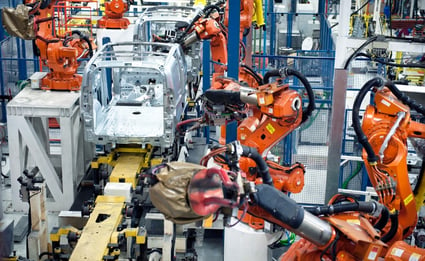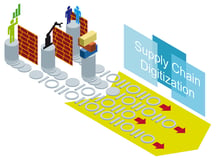5 Competitive Advantages of Embracing Industry 4.0
Nick Ostdick - January 26, 2017

The widespread introduction of Industry 4.0 in the automotive supply chain has been a truly disruptive force for planners and managers in rethinking how they conceive of intelligent supply chain management. With an emphasis on lean manufacturing principles, Industry 4.0 has not only pushed OEMs, manufacturers, and suppliers to adopt more streamlined planning and production practices, but it also provides companies with more holistic, robust reporting capabilities to better serve demand planning, forecasting, and modeling platforms.
Yet, even with the host of benefits Industry 4.0 provides, there are still factions of the automotive supply chain that have been slow to embrace this new way of doing business. Whether it’s because these companies are troubled by the technical challenges of incorporating Industry 4.0 or simple a lack of understanding about the benefits Industry 4.0 offers, companies failing to subscribe to this more advanced model of supply chain management can find themselves struggling to compete in growing global marketplace.
On the other hand, companies who embrace Industry 4.0 will find themselves in prime position to leverage a number of key competitive advantages for success in the short, mid, and long-term future.
Cloud technology
The Industry 4.0 supply chain is a data-driven enterprise where the insights gained from this data can be actualized to streamline processes at a variety of touch points across the value chain. As a result, Industry 4.0 demands a powerful platform for storing, sorting, and retrieving massive amounts of detailed data and reporting. Enter cloud technology and its ability to house large volumes of data with multiple access points for enhanced communication and collaboration across the supply chain. With vast amounts of storage space and the capacity to view and manage data in real-time, the integration of cloud technology is not only a key advantage of embracing Industry 4.0, but it’s also an important component of the future of supply chain management.
Embracing The Internet of Things
If we think of Industry 4.0 as the evolution of the ‘smart factory,’ then it makes sense how the Internet of Things (IOT) and its reliance on the communication between machines and systems is a key advantage of leveraging Industry 4.0. The ability of systems and solutions to work in conjunction with each other not only fosters greater productivity and accuracy, but it also provides greater visibility into a company’s overall supply situation. Because Industry 4.0 is in large part about making OEMs and manufacturers more agile and responsive, the IOT becomes a core driver in creating valuable insight into a company’s demand planning, production, and inventory practices.
Integration of advanced analytics
We discussed at length on this blog the benefits and advantages of advanced analytics in cutting the complexities of today’s global supply chain, and the adoption of Industry 4.0 is perhaps where advanced analytics proves most valuable. The ability to optimize production programs and processes is a critical driver for companies in maintaining high levels of productivity and efficiency, and advanced analytics gives planners and managers the data-driven insight to make informed decisions about planning strategies and planned production programs. Industry 4.0 uses advanced analytics to support the push for greater end-to-end (E2E) visibility and increased supply chain agility, both of which are key in avoiding bottlenecks and creating stability across the entire value chain.
Enhanced customization
There’s no such thing as a ‘one-size-fits all’ solution in today’s global supply chain. Planners and managers require individualized solutions to challenges. As such, the customization of products is an increasingly frequent concern for OEMs and manufacturers in a variant-rich industry an increasing number of global players and partners. Industry 4.0 - alongside such production principles as additive manufacturing - allow OEMs to enhance their customization capabilities to address the specific needs of individual customers. The ability to service this level of customization means companies will be more responsive to restraints in production programs and better equipped to weather potential breakdowns or slowdowns in the movement of parts throughout the supply chain.
Improved communication
Because Industry 4.0 relies heavily on the coordination and communication of intelligent planning platforms or solutions, planners and managers are better able to gather, sort, share, and collaborate on actionable data sets for improved efficiency and productivity. Bottom line: Industry 4.0 puts more data in the hands of more individuals who can work with that data to streamline how a manufacturer operates it planning and production stages. This helps breakdown functional and planning silos, which can hamper a company's ability to operate as efficiently as possible.
If you want to learn more get your Guide to Industry 4.0:
LATEST POSTS
- Understand Why Production Planning Needs Specialized Solutions
- Understand Circular Economy in The Manufacturing Industry
- How Can Industry 4.0 IT Integration Be Achieved Smoothly?
- The Significance of Order Sequencing in Discrete Manufacturing
- How to improve your Supply Chain Management: The Power of Control Towers



